The Shift in historical perception from tradition to modern in Viet Nam in the early twentieth century
In the late nineteenth and early twentieth century, the intelligentsia of the colonial
countries and ones being threatened by Western colonial dominance in Asia
began to re-perceive the problems of sovereignty, nation-state, and re-ask
questions like "What is history for?" as well as review what previous historians
wrote about their national history. From re-realizing history and rewriting history
according to new perspectives, historiography in these countries has shifted from
"traditional" to "modern" with taking Western science as the main direction.
Vietnamese historiography is also not out of that general change. Examining the
product of historical books at the beginning of the twentieth century, Phan Boi
Chau is considered as the pioneer historian for that historiographical turn. The
article focuses on analyzing the new historical viewpoints of Phan Boi Chau from
the global perspective of the flow of thought in Asian countries at that time.
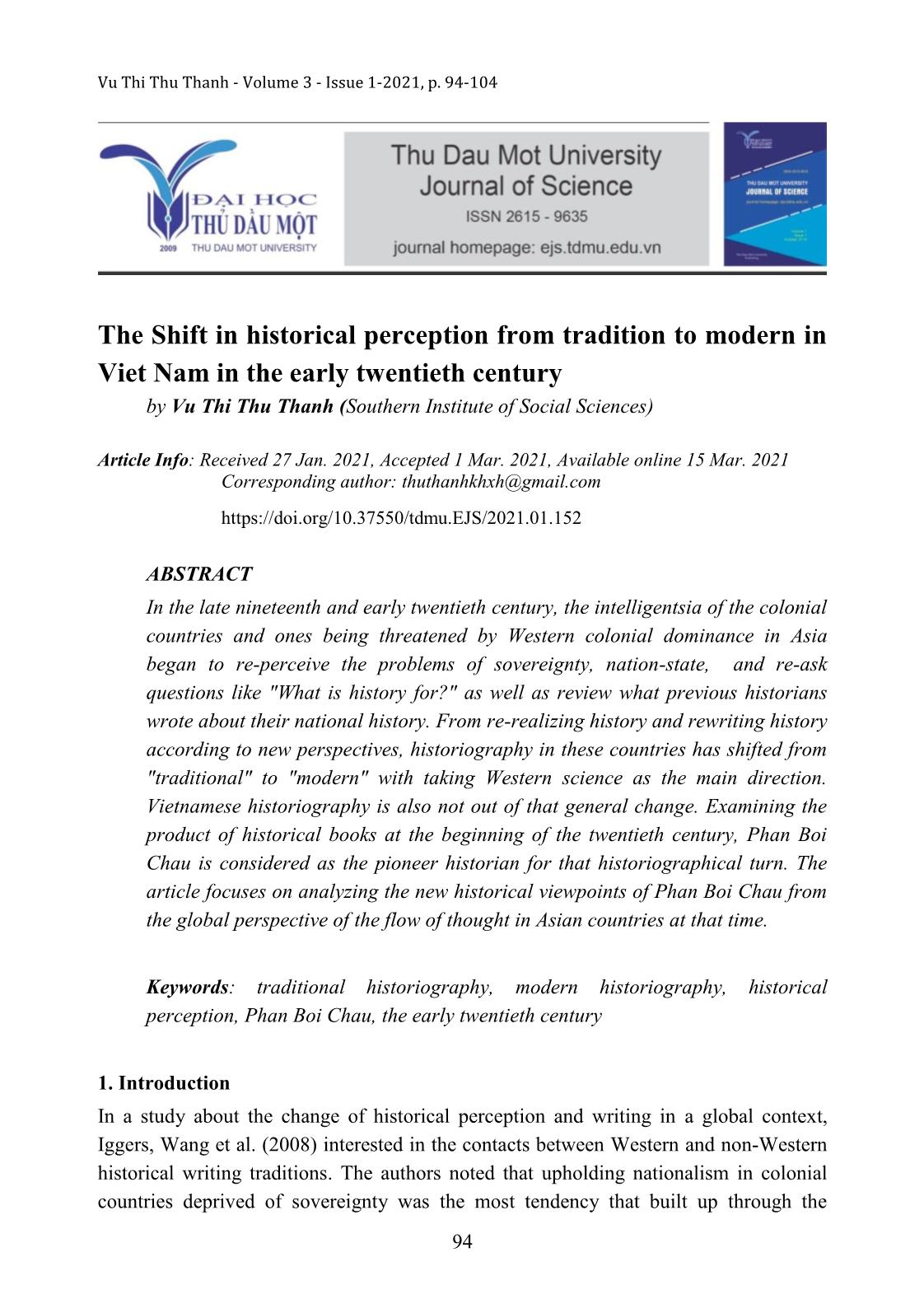
Trang 1
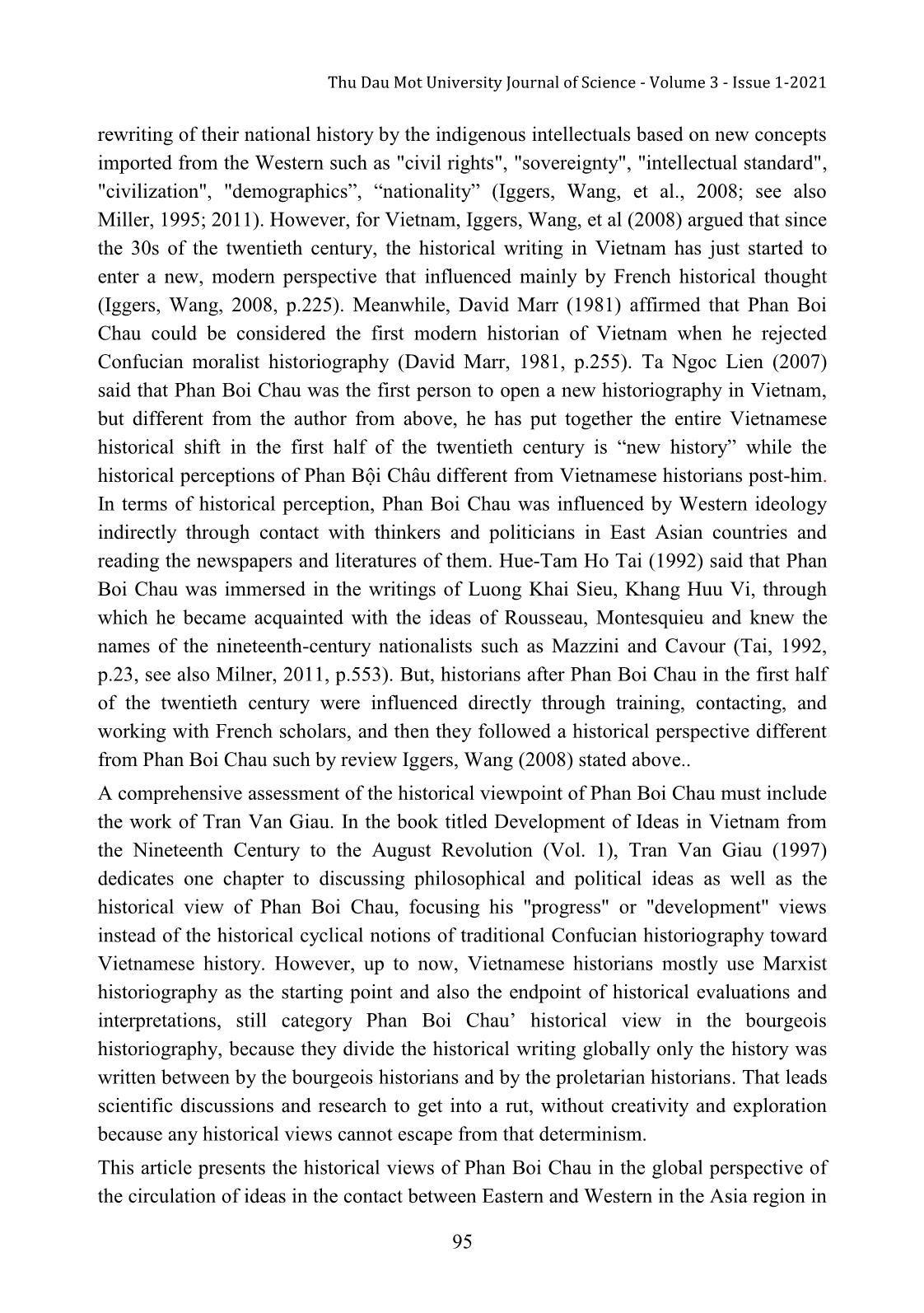
Trang 2
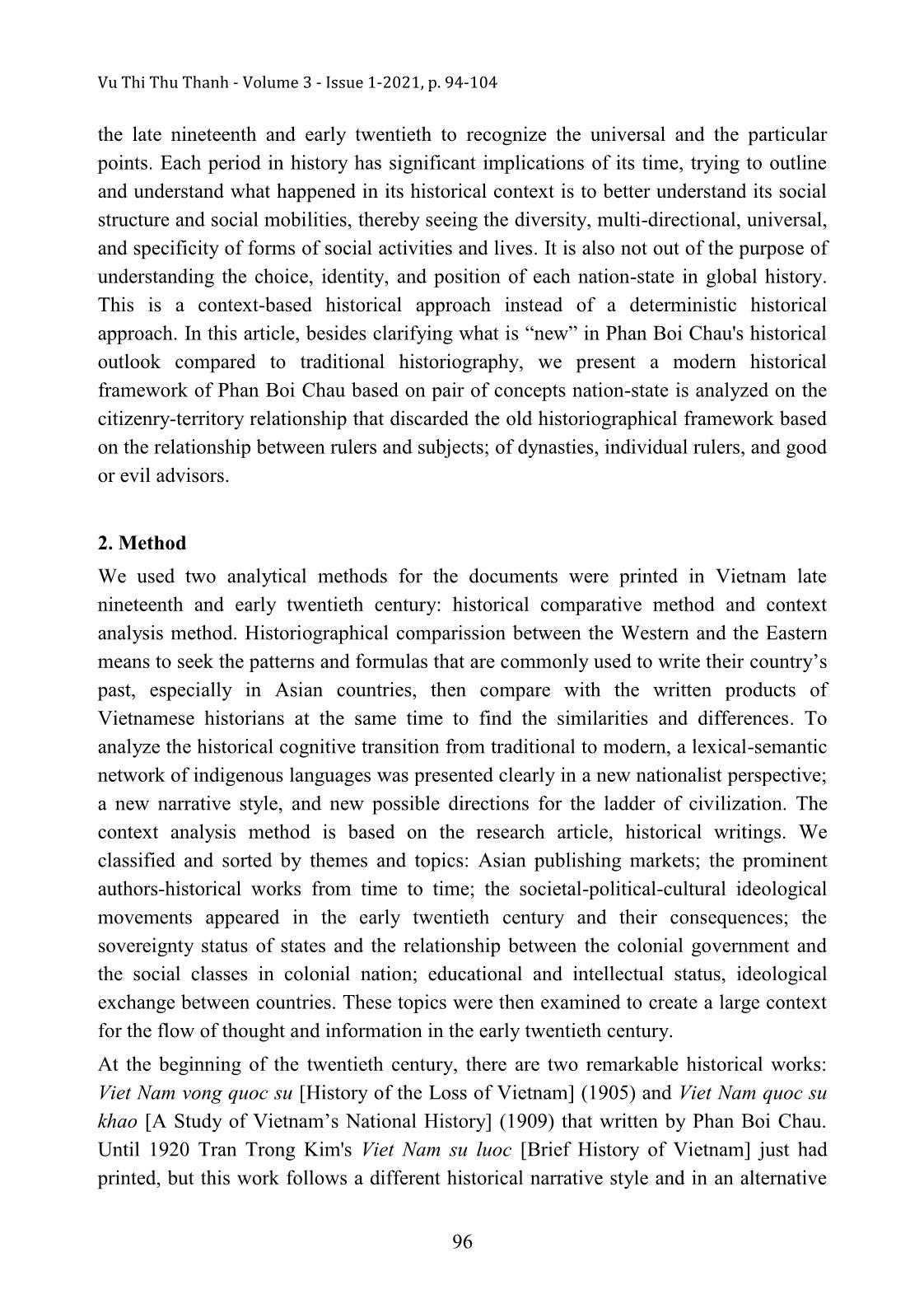
Trang 3
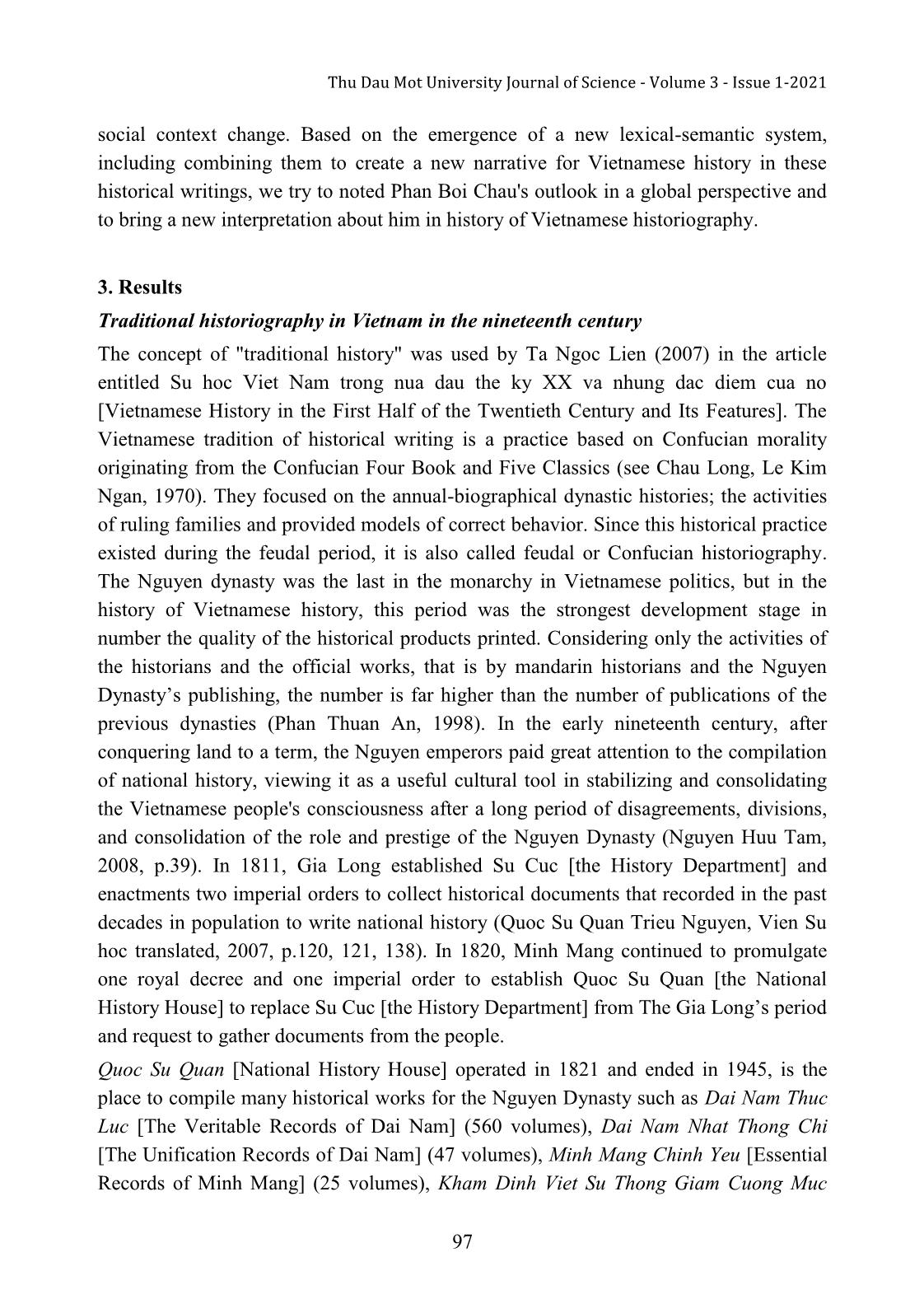
Trang 4
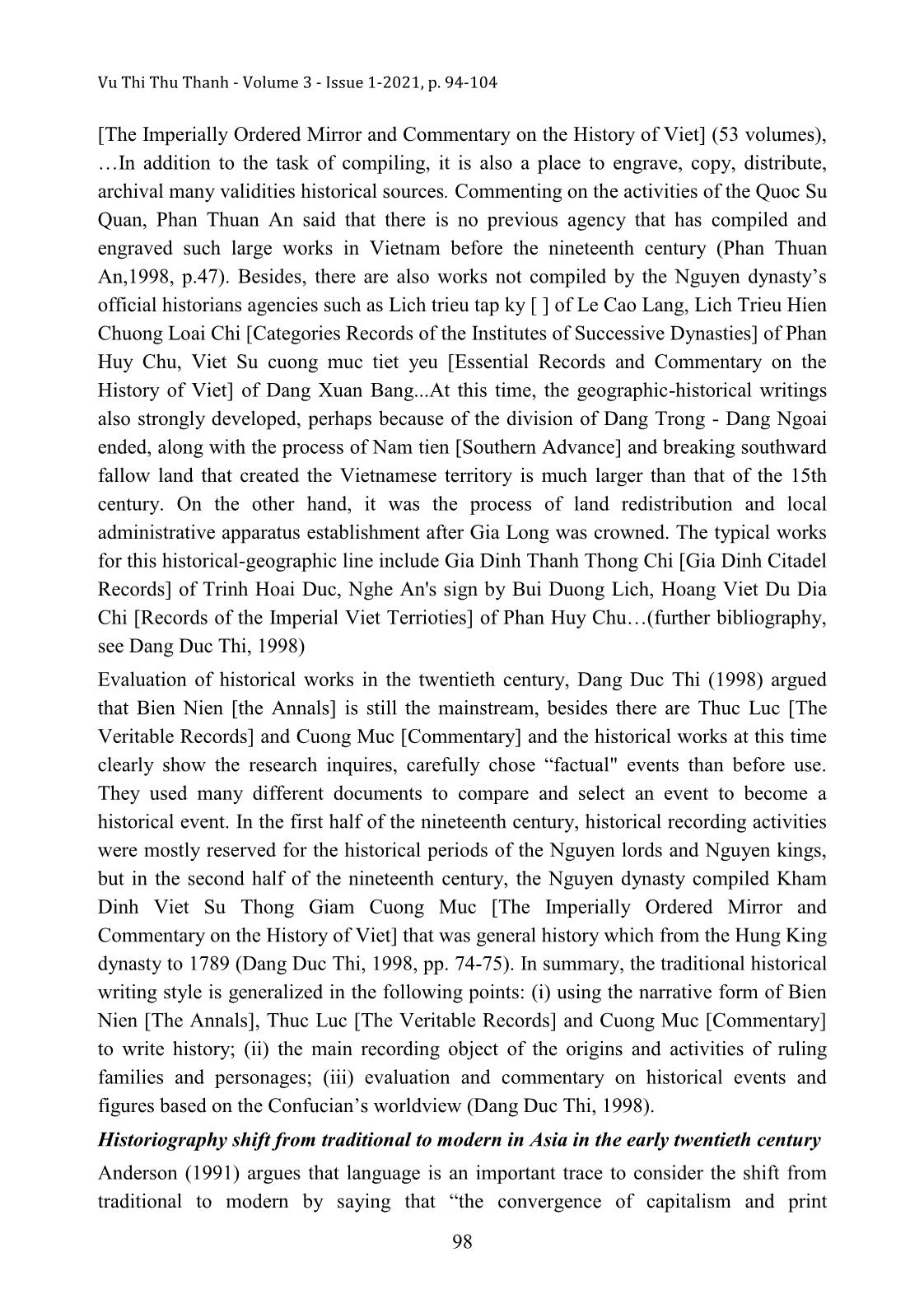
Trang 5
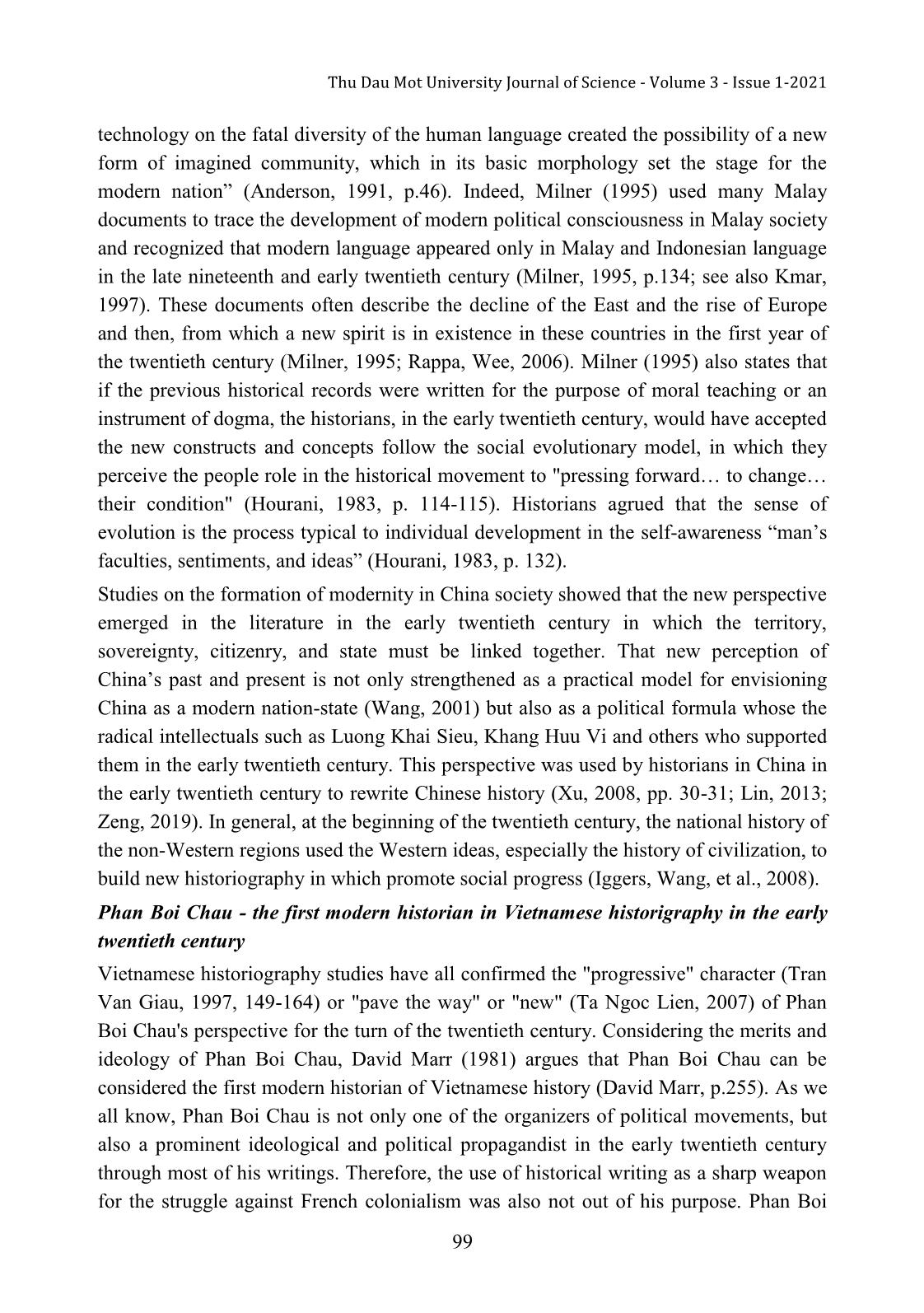
Trang 6
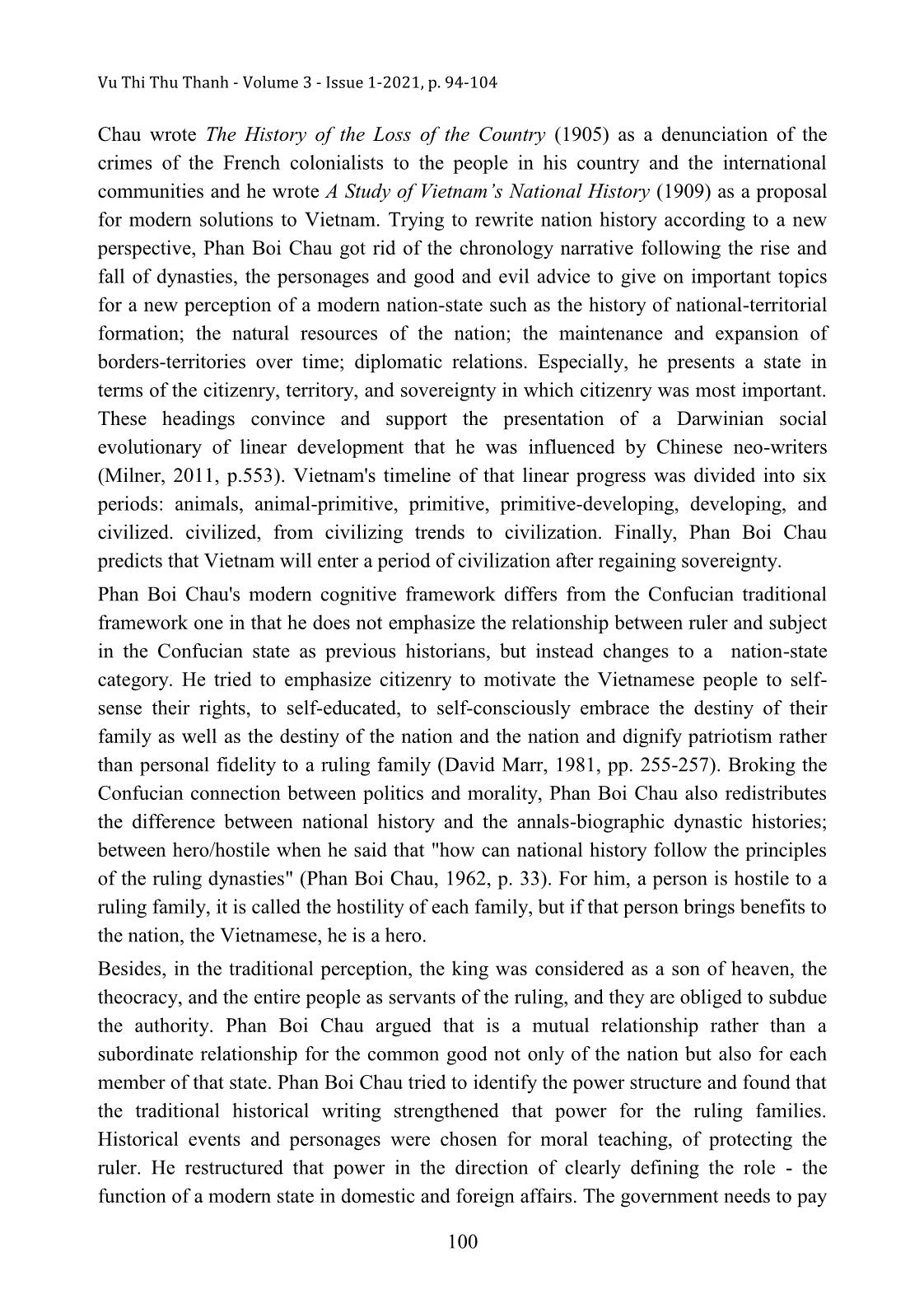
Trang 7
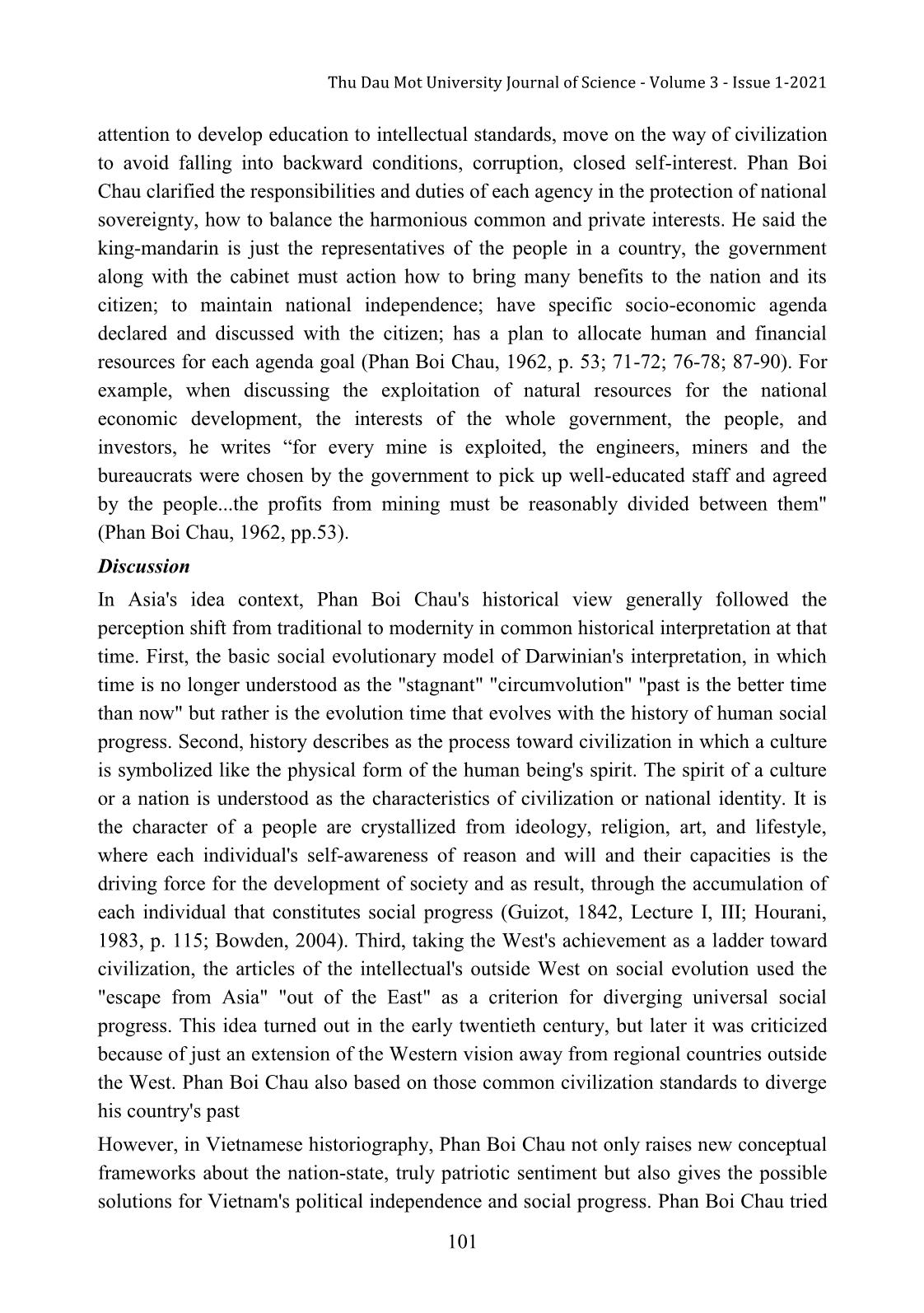
Trang 8
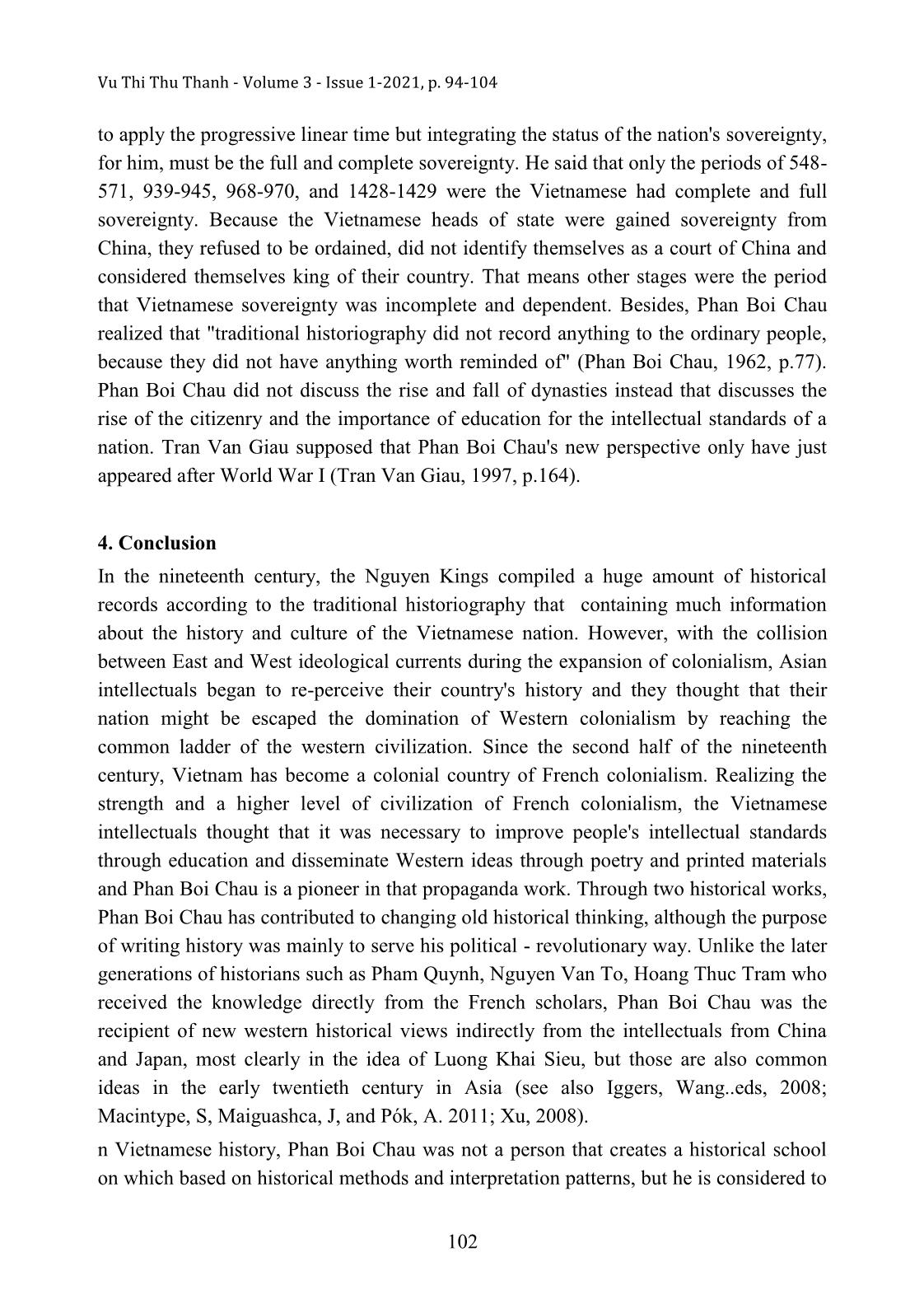
Trang 9
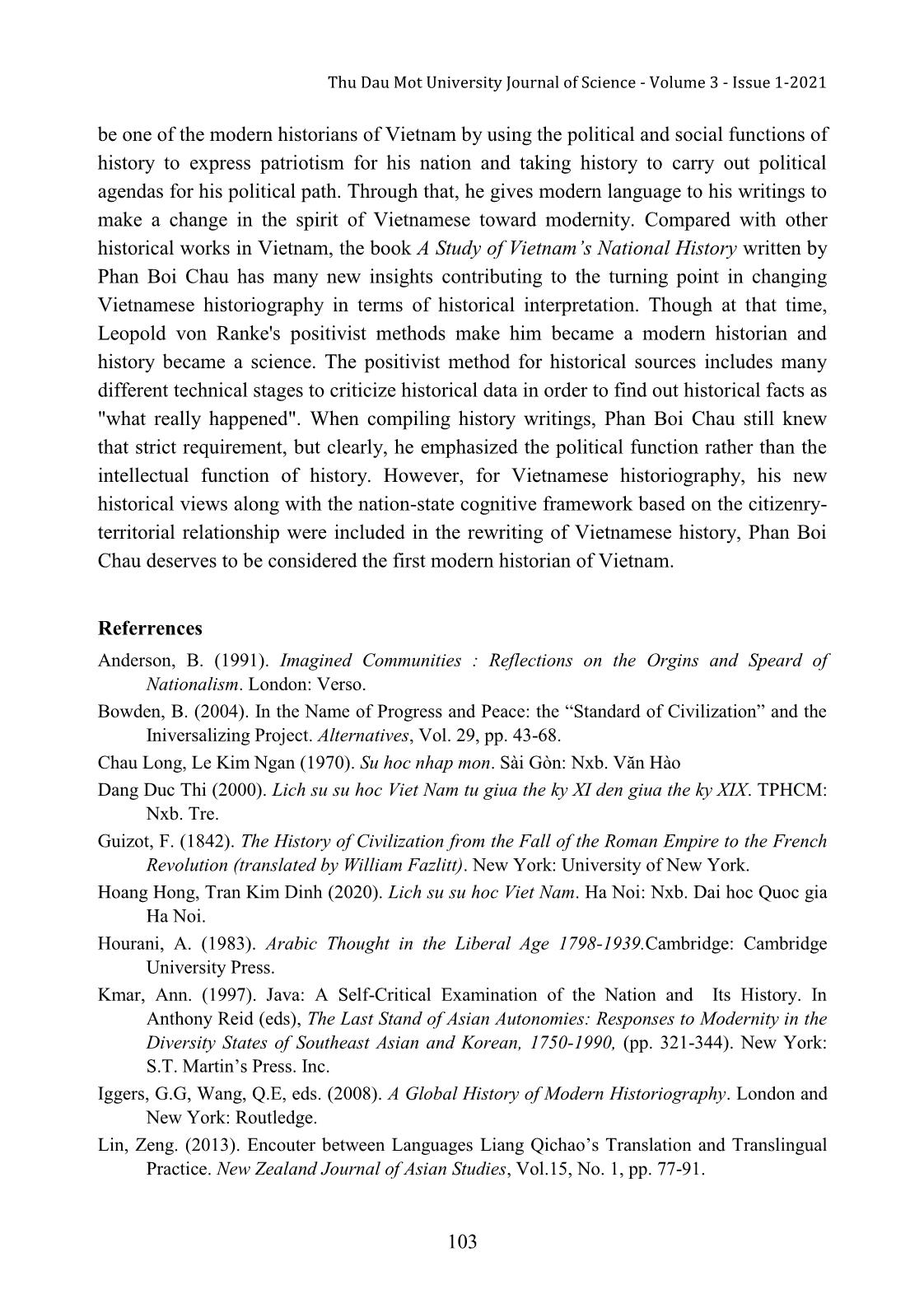
Trang 10
Tải về để xem bản đầy đủ
Tóm tắt nội dung tài liệu: The Shift in historical perception from tradition to modern in Viet Nam in the early twentieth century
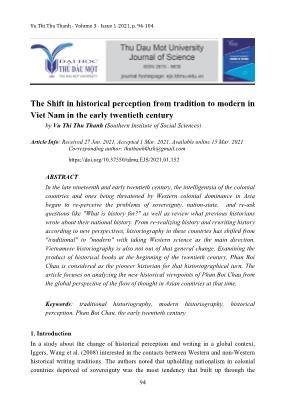
istorical writing as a sharp weapon for the struggle against French colonialism was also not out of his purpose. Phan Boi 99 Vu Thi Thu Thanh - Volume 3 - Issue 1-2021, p. 94-104 Chau wrote The History of the Loss of the Country (1905) as a denunciation of the crimes of the French colonialists to the people in his country and the international communities and he wrote A Study of Vietnam’s National History (1909) as a proposal for modern solutions to Vietnam. Trying to rewrite nation history according to a new perspective, Phan Boi Chau got rid of the chronology narrative following the rise and fall of dynasties, the personages and good and evil advice to give on important topics for a new perception of a modern nation-state such as the history of national-territorial formation; the natural resources of the nation; the maintenance and expansion of borders-territories over time; diplomatic relations. Especially, he presents a state in terms of the citizenry, territory, and sovereignty in which citizenry was most important. These headings convince and support the presentation of a Darwinian social evolutionary of linear development that he was influenced by Chinese neo-writers (Milner, 2011, p.553). Vietnam's timeline of that linear progress was divided into six periods: animals, animal-primitive, primitive, primitive-developing, developing, and civilized. civilized, from civilizing trends to civilization. Finally, Phan Boi Chau predicts that Vietnam will enter a period of civilization after regaining sovereignty. Phan Boi Chau's modern cognitive framework differs from the Confucian traditional framework one in that he does not emphasize the relationship between ruler and subject in the Confucian state as previous historians, but instead changes to a nation-state category. He tried to emphasize citizenry to motivate the Vietnamese people to self- sense their rights, to self-educated, to self-consciously embrace the destiny of their family as well as the destiny of the nation and the nation and dignify patriotism rather than personal fidelity to a ruling family (David Marr, 1981, pp. 255-257). Broking the Confucian connection between politics and morality, Phan Boi Chau also redistributes the difference between national history and the annals-biographic dynastic histories; between hero/hostile when he said that "how can national history follow the principles of the ruling dynasties" (Phan Boi Chau, 1962, p. 33). For him, a person is hostile to a ruling family, it is called the hostility of each family, but if that person brings benefits to the nation, the Vietnamese, he is a hero. Besides, in the traditional perception, the king was considered as a son of heaven, the theocracy, and the entire people as servants of the ruling, and they are obliged to subdue the authority. Phan Boi Chau argued that is a mutual relationship rather than a subordinate relationship for the common good not only of the nation but also for each member of that state. Phan Boi Chau tried to identify the power structure and found that the traditional historical writing strengthened that power for the ruling families. Historical events and personages were chosen for moral teaching, of protecting the ruler. He restructured that power in the direction of clearly defining the role - the function of a modern state in domestic and foreign affairs. The government needs to pay 100 Thu Dau Mot University Journal of Science - Volume 3 - Issue 1-2021 attention to develop education to intellectual standards, move on the way of civilization to avoid falling into backward conditions, corruption, closed self-interest. Phan Boi Chau clarified the responsibilities and duties of each agency in the protection of national sovereignty, how to balance the harmonious common and private interests. He said the king-mandarin is just the representatives of the people in a country, the government along with the cabinet must action how to bring many benefits to the nation and its citizen; to maintain national independence; have specific socio-economic agenda declared and discussed with the citizen; has a plan to allocate human and financial resources for each agenda goal (Phan Boi Chau, 1962, p. 53; 71-72; 76-78; 87-90). For example, when discussing the exploitation of natural resources for the national economic development, the interests of the whole government, the people, and investors, he writes “for every mine is exploited, the engineers, miners and the bureaucrats were chosen by the government to pick up well-educated staff and agreed by the people...the profits from mining must be reasonably divided between them" (Phan Boi Chau, 1962, pp.53). Discussion In Asia's idea context, Phan Boi Chau's historical view generally followed the perception shift from traditional to modernity in common historical interpretation at that time. First, the basic social evolutionary model of Darwinian's interpretation, in which time is no longer understood as the "stagnant" "circumvolution" "past is the better time than now" but rather is the evolution time that evolves with the history of human social progress. Second, history describes as the process toward civilization in which a culture is symbolized like the physical form of the human being's spirit. The spirit of a culture or a nation is understood as the characteristics of civilization or national identity. It is the character of a people are crystallized from ideology, religion, art, and lifestyle, where each individual's self-awareness of reason and will and their capacities is the driving force for the development of society and as result, through the accumulation of each individual that constitutes social progress (Guizot, 1842, Lecture I, III; Hourani, 1983, p. 115; Bowden, 2004). Third, taking the West's achievement as a ladder toward civilization, the articles of the intellectual's outside West on social evolution used the "escape from Asia" "out of the East" as a criterion for diverging universal social progress. This idea turned out in the early twentieth century, but later it was criticized because of just an extension of the Western vision away from regional countries outside the West. Phan Boi Chau also based on those common civilization standards to diverge his country's past However, in Vietnamese historiography, Phan Boi Chau not only raises new conceptual frameworks about the nation-state, truly patriotic sentiment but also gives the possible solutions for Vietnam's political independence and social progress. Phan Boi Chau tried 101 Vu Thi Thu Thanh - Volume 3 - Issue 1-2021, p. 94-104 to apply the progressive linear time but integrating the status of the nation's sovereignty, for him, must be the full and complete sovereignty. He said that only the periods of 548- 571, 939-945, 968-970, and 1428-1429 were the Vietnamese had complete and full sovereignty. Because the Vietnamese heads of state were gained sovereignty from China, they refused to be ordained, did not identify themselves as a court of China and considered themselves king of their country. That means other stages were the period that Vietnamese sovereignty was incomplete and dependent. Besides, Phan Boi Chau realized that "traditional historiography did not record anything to the ordinary people, because they did not have anything worth reminded of" (Phan Boi Chau, 1962, p.77). Phan Boi Chau did not discuss the rise and fall of dynasties instead that discusses the rise of the citizenry and the importance of education for the intellectual standards of a nation. Tran Van Giau supposed that Phan Boi Chau's new perspective only have just appeared after World War I (Tran Van Giau, 1997, p.164). 4. Conclusion In the nineteenth century, the Nguyen Kings compiled a huge amount of historical records according to the traditional historiography that containing much information about the history and culture of the Vietnamese nation. However, with the collision between East and West ideological currents during the expansion of colonialism, Asian intellectuals began to re-perceive their country's history and they thought that their nation might be escaped the domination of Western colonialism by reaching the common ladder of the western civilization. Since the second half of the nineteenth century, Vietnam has become a colonial country of French colonialism. Realizing the strength and a higher level of civilization of French colonialism, the Vietnamese intellectuals thought that it was necessary to improve people's intellectual standards through education and disseminate Western ideas through poetry and printed materials and Phan Boi Chau is a pioneer in that propaganda work. Through two historical works, Phan Boi Chau has contributed to changing old historical thinking, although the purpose of writing history was mainly to serve his political - revolutionary way. Unlike the later generations of historians such as Pham Quynh, Nguyen Van To, Hoang Thuc Tram who received the knowledge directly from the French scholars, Phan Boi Chau was the recipient of new western historical views indirectly from the intellectuals from China and Japan, most clearly in the idea of Luong Khai Sieu, but those are also common ideas in the early twentieth century in Asia (see also Iggers, Wang..eds, 2008; Macintype, S, Maiguashca, J, and Pók, A. 2011; Xu, 2008). n Vietnamese history, Phan Boi Chau was not a person that creates a historical school on which based on historical methods and interpretation patterns, but he is considered to 102 Thu Dau Mot University Journal of Science - Volume 3 - Issue 1-2021 be one of the modern historians of Vietnam by using the political and social functions of history to express patriotism for his nation and taking history to carry out political agendas for his political path. Through that, he gives modern language to his writings to make a change in the spirit of Vietnamese toward modernity. Compared with other historical works in Vietnam, the book A Study of Vietnam’s National History written by Phan Boi Chau has many new insights contributing to the turning point in changing Vietnamese historiography in terms of historical interpretation. Though at that time, Leopold von Ranke's positivist methods make him became a modern historian and history became a science. The positivist method for historical sources includes many different technical stages to criticize historical data in order to find out historical facts as "what really happened". When compiling history writings, Phan Boi Chau still knew that strict requirement, but clearly, he emphasized the political function rather than the intellectual function of history. However, for Vietnamese historiography, his new historical views along with the nation-state cognitive framework based on the citizenry- territorial relationship were included in the rewriting of Vietnamese history, Phan Boi Chau deserves to be considered the first modern historian of Vietnam. Referrences Anderson, B. (1991). Imagined Communities : Reflections on the Orgins and Speard of Nationalism. London: Verso. Bowden, B. (2004). In the Name of Progress and Peace: the “Standard of Civilization” and the Iniversalizing Project. Alternatives, Vol. 29, pp. 43-68. Chau Long, Le Kim Ngan (1970). Su hoc nhap mon. S i G n: Nxb. V n H o Dang Duc Thi (2000). Lich su su hoc Viet Nam tu giua the ky XI den giua the ky XIX. TPHCM: Nxb. Tre. Guizot, F. (1842). The History of Civilization from the Fall of the Roman Empire to the French Revolution (translated by William Fazlitt). New York: University of New York. Hoang Hong, Tran Kim Dinh (2020). Lich su su hoc Viet Nam. Ha Noi: Nxb. Dai hoc Quoc gia Ha Noi. Hourani, A. (1983). Arabic Thought in the Liberal Age 1798-1939.Cambridge: Cambridge University Press. Kmar, Ann. (1997). Java: A Self-Critical Examination of the Nation and Its History. In Anthony Reid (eds), The Last Stand of Asian Autonomies: Responses to Modernity in the Diversity States of Southeast Asian and Korean, 1750-1990, (pp. 321-344). New York: S.T. Martin’s Press. Inc. Iggers, G.G, Wang, Q.E, eds. (2008). A Global History of Modern Historiography. London and New York: Routledge. Lin, Zeng. (2013). Encouter between Languages Liang Qichao’s Translation and Translingual Practice. New Zealand Journal of Asian Studies, Vol.15, No. 1, pp. 77-91. 103 Vu Thi Thu Thanh - Volume 3 - Issue 1-2021, p. 94-104 Nguyen Huu Tam (2008). Qua trinh hinh thanh quoc su quan trieu Nguyen. Nghien cuu Lich su, no. 3, tr. 38-46. Macintype, S, Maiguashca, J, and Pók, A. (2011). The Oxford History of Historical Writing, vol.4 (1800-1945). Oxford: Oxford University Press Marr, David. (1981). Vietnamese Tradition on Trial, 1920-1945. Berkeley: University of California Press. Milner, Anthony. (1995). The Invention of Politics in Colonial Malaya: Contesting Nationalism and the Expansion of the Public Sphere. Cambridge: Cambridge University Press. Milner, Anthony. (2011). Southeast Asia Historical Writing. In A. Milner (eds) The Oxford History of Historical Writing, vol.4 (1800-1945) pp .537-558. Oxford: Oxford University Press,. Phan Boi Chau (1962 [1909]). Viet Nam quoc su khao [A Study of Vietnam’s National History] (Chuong Thau translate). Ha Noi: Nxb. Giao duc. Phan Boi Chau (1969 [1905]). Viet Nam vong quoc su [The History of the Loss of the Country] (Nguyen Quang To translated). Sai Gon: Nxb. Tao Dan. Phan Thuan An (1998). Quoc su quan trieu Nguyen va gia tri cua no trong nen hoc thuat Viet Nam [ ]. Trong Viet nam hoc – Ky yeu hoi thao lan thu nhat (tr. 463-473). Ha Noi: Dai hoc Quoc gia Ha Noi. Rappa, A.L, Wee, L. (2006). Language Policy and Modernity in Southeast Asia: Malaysia, the Philippines, and Thailand. USA: Springer. Ta Ngoc Lien (2007). Su hoc Viet Nam nua dau the ky XX va nhung dac diem cua no. Nghien cuu Lich Su, số 8, tr. 11-20. Tai, Hue-Tam Ho (1992). Radicalism and the Origins of the Vietnamese Revolution. USA: Harvard University Press. Tran Van Giau (1997). Su phat trien cua tu tuong Viet Nam tu the ky XIX den cach mang thang Tam (vol. 2). Ha Noi: Nxb. Chinh tri Quoc gia. Wang, Q.E. (2001). Inverting China through History: the May Fouth Approach to Historiography. USA: State University of New York Press. Xu. Xiaoqun. (2008). Trial of Modernity: Judicial Reform in Early Twentieth-Century China 1901-1937. Standford: Standford University Press. Zeng, Dahua. (2019). Modern Chinese Nationalism and the Awakening of Self-Consiousness of Chinaese Nation. International Journal of Anthropology and Ethology, Vol. 31, No. 3, pp. 1-25. 104
File đính kèm:
 the_shift_in_historical_perception_from_tradition_to_modern.pdf
the_shift_in_historical_perception_from_tradition_to_modern.pdf

